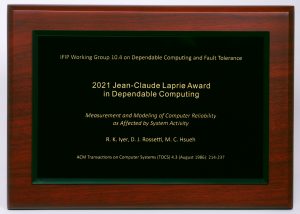 Prof. Iyer and his team are working to automate the control and management of supercomputers so as to improve performance and resilience of supercomputing applications. Read more →
Prof. Iyer and his team are working to automate the control and management of supercomputers so as to improve performance and resilience of supercomputing applications. Read more →
 Prof. Iyer and his team are working to automate the control and management of supercomputers so as to improve performance and resilience of supercomputing applications. Read more →
Prof. Iyer and his team are working to automate the control and management of supercomputers so as to improve performance and resilience of supercomputing applications. Read more →
 Professor Iyer and his co-authors; David Rossetti and Mei-Chen Hsueh; were recently awarded the Jean-Claude Laprie Award at DSN21 for the paper entitled “Measurement and Modeling of Computer Reliability as Affected by System Activity, ACM TOCS 1986″.
Professor Iyer and his co-authors; David Rossetti and Mei-Chen Hsueh; were recently awarded the Jean-Claude Laprie Award at DSN21 for the paper entitled “Measurement and Modeling of Computer Reliability as Affected by System Activity, ACM TOCS 1986″.
The award committee states “Measurement and modeling of computer reliability as affected by system activity” authored by R. K. Iyer, D. J. Rossetti, and M. C. Hsueh and published in ACM Transactions on Computer Systems in 1986 was one of the first papers to perform empirical studies of failures in real systems (IBM Mainframe and the Stanford Linear Accelerator Computing System). The paper showed that there exists a strong correlation between the nature of the workload and its intensity and the failure rate of the system. This was a seminal result in that it showed that one needs to understand the overall system’s composition and behavior, in order to make predictions of its overall reliability. It also established the primary role of empirical measurements of failures of real systems, rather than rely upon (simple) analytical or simulation models of failures, and hence established the scientific foundations of the field of empirical reliability measurement.
The paper has had a tremendous impact in shaping subsequent empirical studies, as well as those in analytical modelling of computer systems. The idea has been incorporated in classical dependability textbooks (e.g., Reliable Computer Systems: Design and Evaluation, Third Edition, By Daniel P. Siewiorek, Robert S. Swarz), dependability tools (e.g., SHARPE) and into many commercial systems for dependability measurement (e.g., by IBM). This paper has been considered as a landmark paper in the field of computer system reliability by the evaluation committee, which resulted in its unanimous selection for the award.”
For more about The Jean-Claude Laprie Award, please visit http://jclaprie-award.dependability.org/
You can view his acceptance video here: https://mediaspace.illinois.edu/media/t/1_gh7vkiwr
“Measurement and modeling of computer reliability as affected by system activity”: https://doi.org/10.1145/6420.6422
Congratulations to Professor Iyer and his co-authors!

Krishnant Saboo has been chosen as the recipient of the 2020-2021 Elsa and Floyd Dunn Award. Established in 2015, this award was set up in honor of Elsa and Floyd Dunn and is presented to a graduate student in the Department of Electrical and Computer Engineering who has demonstrated research interest in topics such as biomedical ultrasound, bioengineering, or related fields. This is a great honor, which recognizes the quality of his graduate research.
According to his Advisor, Professor Ravi Iyer “Krishnakant has used his intuitive understanding of brain health together with his deep mathematical skills in machine learning and statistics to tackle complex problems related to diagnosis and treatment of brain disorders. He has worked in successful collaboration with several clinicians and scientists at Mayo Clinic and the Virginia Commonwealth University Medical Center in modeling diseases including epilepsy, Alzheimer’s disease, and hepatic encephalopathy (brain dysfunction due to liver cirrhosis). In creating these models, he has combined domain knowledge with statistical techniques, and data – a prominently useful skill in the face of the growing challenge of learning from limited data.”
To learn more about this award, please visit: https://ece.illinois.edu/academics/grad/awards/dunn

We are delighted that two of our students, Haoran Qiu (CS) and Haotian Chen (ECE) are winners of the Yunni & Maxine Pao Memorial Fellowship this year. This Fellowship is awarded to high-achieving students in CS or ECE departments.
“I believe Haoran’s paper on FIRM attracted significant industry attention, particularly from IBM, and that was an important factor in him being selected for this award” according to Professor Iyer.
He goes on to say, “I think Haotian’s work on COVID data especially in the early days when COVID was at its peak and impacting the large metropolitan hospitals and his outstanding performance in his coursework were key factors in his selection for this Yunni & Maxine Pao Memorial Fellowship award.”